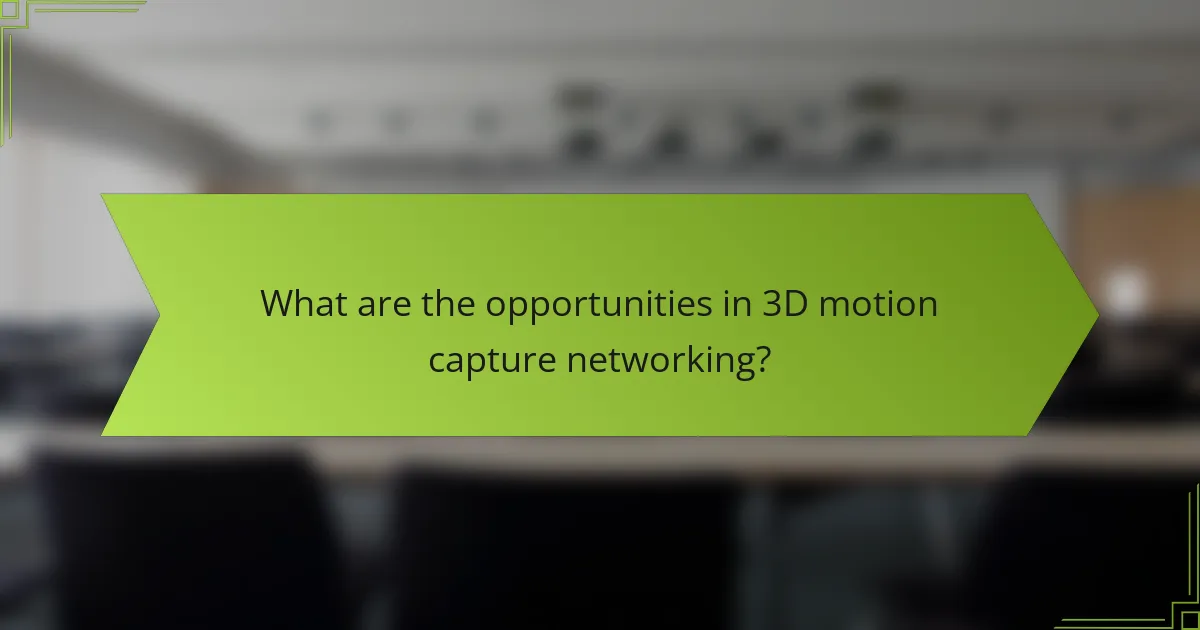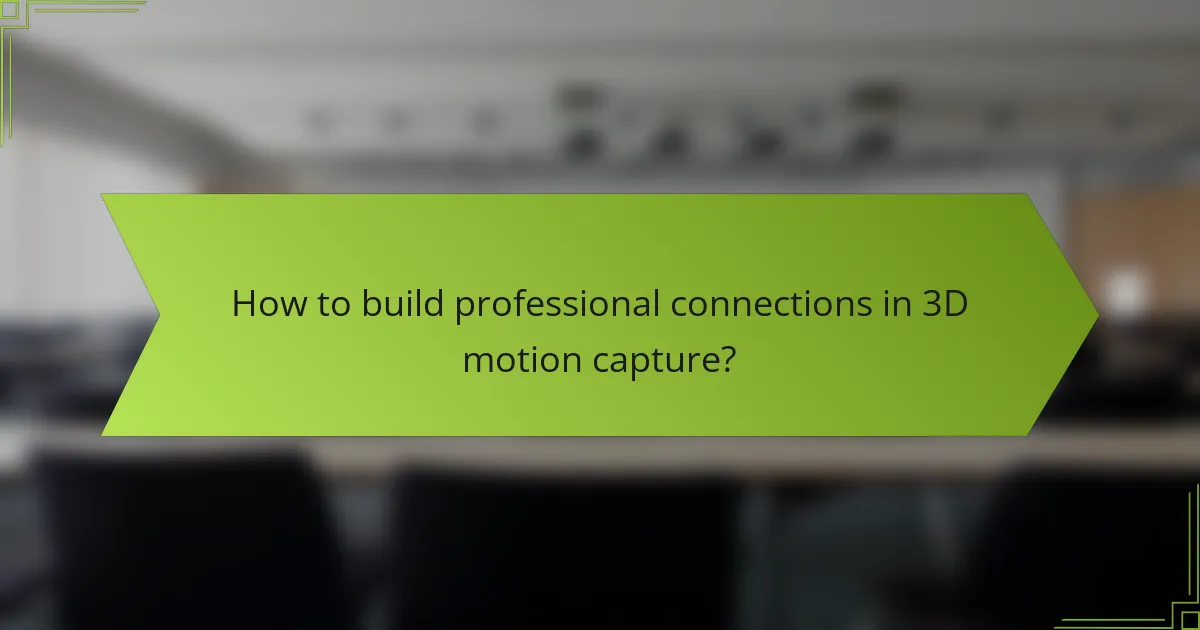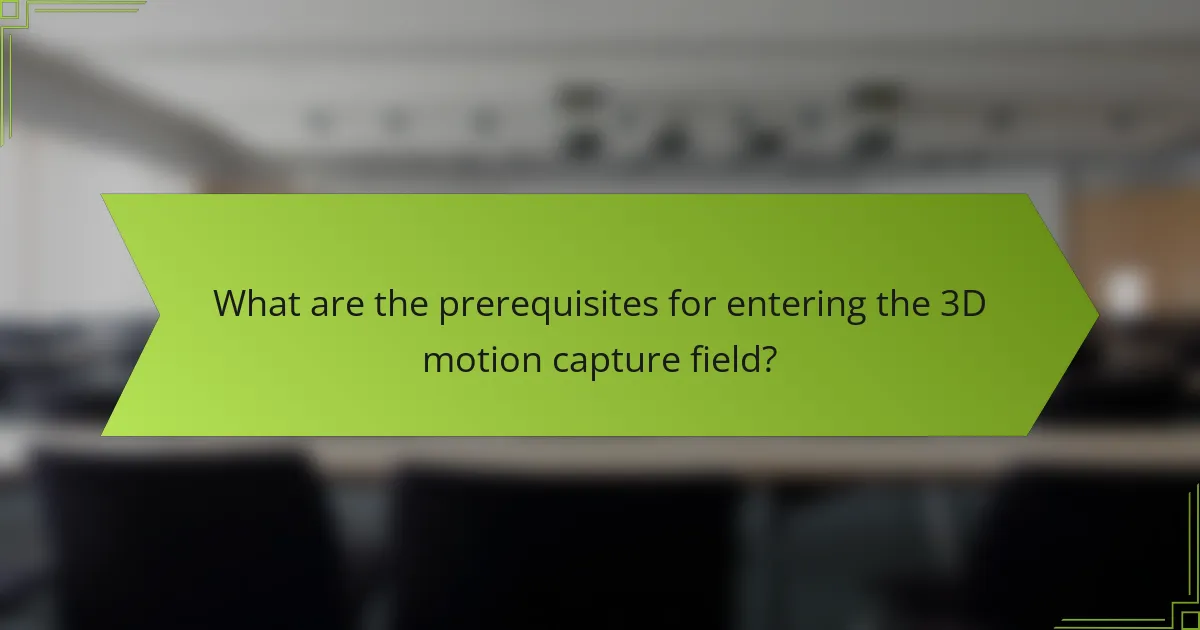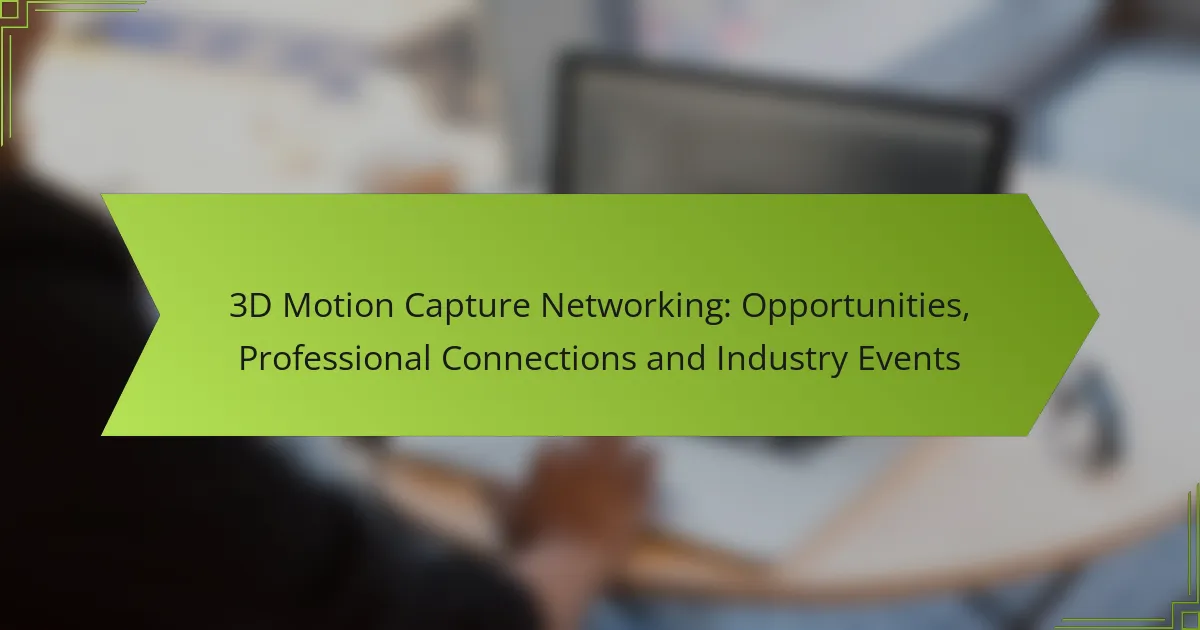3D motion capture networking presents a wealth of opportunities for professionals to connect and collaborate across diverse sectors such as gaming, film, and virtual reality. Engaging in industry events and discussions not only enhances skills but also fosters valuable relationships that can lead to exciting collaborations and career advancements.

What are the opportunities in 3D motion capture networking?
3D motion capture networking offers various opportunities for professionals to connect, collaborate, and innovate within the industry. By engaging with different sectors such as gaming, film, and virtual reality, individuals can enhance their skills and expand their professional reach.
Collaboration with game development studios
Partnering with game development studios allows motion capture professionals to contribute to the creation of immersive gaming experiences. These collaborations often involve providing motion data for character animations, which can significantly enhance gameplay realism.
To effectively collaborate, professionals should showcase their previous work and be open to feedback. Building relationships through industry events or online platforms can lead to potential projects and long-term partnerships.
Partnerships with film production companies
Film production companies frequently seek motion capture experts to create lifelike animations for characters and special effects. These partnerships can lead to significant projects, especially in genres like action and fantasy where visual effects play a crucial role.
Networking at film festivals or industry expos can facilitate introductions to key decision-makers. Professionals should prepare a portfolio that highlights relevant experience and be ready to discuss how their skills can enhance film production quality.
Networking with virtual reality developers
Virtual reality (VR) developers rely on motion capture to create engaging, interactive environments. Networking with these developers can open doors to innovative projects that blend technology and storytelling.
Attending VR-focused conferences or joining online forums can help professionals connect with developers. Sharing insights on motion capture techniques and applications can establish credibility and lead to collaborative opportunities.
Access to academic research initiatives
Engaging with academic institutions can provide access to cutting-edge research in motion capture technology. Collaborating on research projects can enhance professional knowledge and lead to advancements in the field.
Professionals should consider reaching out to universities with strong programs in animation or computer graphics. Participating in workshops or seminars can also facilitate connections with researchers and students interested in motion capture.
Engagement with animation professionals
Animation professionals often seek motion capture specialists to improve the fluidity and realism of animated characters. Building relationships in this area can lead to joint projects that leverage both skill sets.
Joining animation guilds or attending industry meetups can help professionals network effectively. Sharing knowledge about motion capture techniques can foster collaboration and enhance the overall quality of animation projects.

How to build professional connections in 3D motion capture?
Building professional connections in 3D motion capture involves engaging with industry peers through various platforms and events. By actively participating in discussions, workshops, and networking opportunities, you can establish valuable relationships that may lead to collaborations and job opportunities.
Join industry-specific online forums
Online forums dedicated to 3D motion capture are excellent places to connect with other professionals. Platforms like Reddit, specialized Facebook groups, and dedicated websites allow you to share knowledge, ask questions, and showcase your work. Engaging in these communities can help you stay updated on industry trends and best practices.
When joining forums, be sure to contribute meaningfully to discussions. Avoid self-promotion unless it is relevant to the conversation, as this can lead to negative perceptions. Instead, focus on providing insights and assistance to others, which can enhance your reputation within the community.
Attend workshops and training sessions
Workshops and training sessions offer hands-on experience and the chance to meet industry experts and peers. Look for events hosted by universities, professional organizations, or industry conferences that focus on 3D motion capture techniques and technologies. These sessions often provide networking opportunities during breaks and group activities.
Consider attending both in-person and virtual workshops to maximize your reach. In-person events may allow for more personal interactions, while virtual sessions can connect you with a broader audience. Always follow up with new contacts after the event to solidify your connections.
Participate in local meetups
Local meetups can be a great way to network with professionals in your area who share an interest in 3D motion capture. Platforms like Meetup.com often list gatherings where you can discuss projects, share experiences, and collaborate on ideas. These informal settings can foster genuine relationships.
Be proactive in introducing yourself and engaging with others at these meetups. Bring business cards or have a digital portfolio ready to share. Follow up with attendees after the meetup to maintain the connection and explore potential collaborations.
Utilize LinkedIn for networking
LinkedIn is a powerful tool for building professional connections in the 3D motion capture industry. Create a comprehensive profile that highlights your skills, experiences, and projects related to motion capture. Actively connect with industry professionals, join relevant groups, and participate in discussions to increase your visibility.
Regularly share content related to 3D motion capture, such as articles, project updates, or insights. This not only showcases your expertise but also encourages engagement from your network. Remember to personalize connection requests to increase the likelihood of acceptance and foster meaningful relationships.

What are the key industry events for 3D motion capture?
Key industry events for 3D motion capture provide valuable opportunities for networking, learning, and showcasing advancements in technology. These gatherings attract professionals from various sectors, including gaming, film, and virtual reality, facilitating connections and collaborations.
Motion Capture Society Annual Conference
The Motion Capture Society Annual Conference is a premier event focused on the latest developments in motion capture technology. It features presentations from industry leaders, workshops, and networking opportunities tailored for professionals in the field.
Attendees can expect discussions on emerging trends, case studies, and hands-on sessions that enhance their understanding of motion capture applications. This conference is ideal for those looking to deepen their expertise and connect with fellow motion capture enthusiasts.
SIGGRAPH Conference
SIGGRAPH is a renowned conference that covers a broad spectrum of computer graphics and interactive techniques, including 3D motion capture. It showcases cutting-edge research, industry innovations, and artistic works that utilize motion capture technology.
Participants can attend technical papers, panels, and exhibitions, making it a great venue for learning and networking. The event attracts professionals from various domains, providing a diverse environment for collaboration and inspiration.
Game Developers Conference (GDC)
The Game Developers Conference (GDC) is a significant event for anyone involved in game development, including motion capture professionals. It features sessions on game design, programming, and technology, with a strong emphasis on the role of motion capture in creating immersive experiences.
Networking opportunities abound, with many industry leaders and emerging talents attending. GDC is an excellent platform for showcasing motion capture techniques and discovering new tools that can enhance game development.
Virtual Reality Developers Conference
The Virtual Reality Developers Conference focuses on advancements in virtual reality, including the integration of motion capture technology. This event brings together developers, artists, and researchers to explore how motion capture enhances VR experiences.
Attendees can participate in workshops and discussions that highlight practical applications of motion capture in VR projects. This conference is essential for those looking to stay at the forefront of VR development and network with like-minded professionals.

What are the prerequisites for entering the 3D motion capture field?
To enter the 3D motion capture field, individuals typically need a strong foundation in animation software and a solid understanding of motion capture technology. These prerequisites are essential for creating realistic animations and effectively utilizing motion capture systems.
Understanding of animation software
A comprehensive knowledge of animation software is crucial for anyone looking to work in 3D motion capture. Popular programs include Autodesk Maya, Blender, and 3ds Max, which allow users to create and manipulate digital characters and environments.
Familiarity with these tools enables professionals to integrate motion capture data seamlessly into their animations. It’s beneficial to practice using these programs through tutorials or projects to build proficiency and develop a strong portfolio.
Familiarity with motion capture technology
Understanding motion capture technology involves knowing how various systems capture and translate human movement into digital data. This includes familiarity with hardware such as cameras, sensors, and software that processes the captured data.
Professionals should also be aware of different motion capture methods, including optical and inertial systems, as each has unique advantages and limitations. Gaining hands-on experience with these technologies through internships or workshops can significantly enhance one’s skill set in the field.
